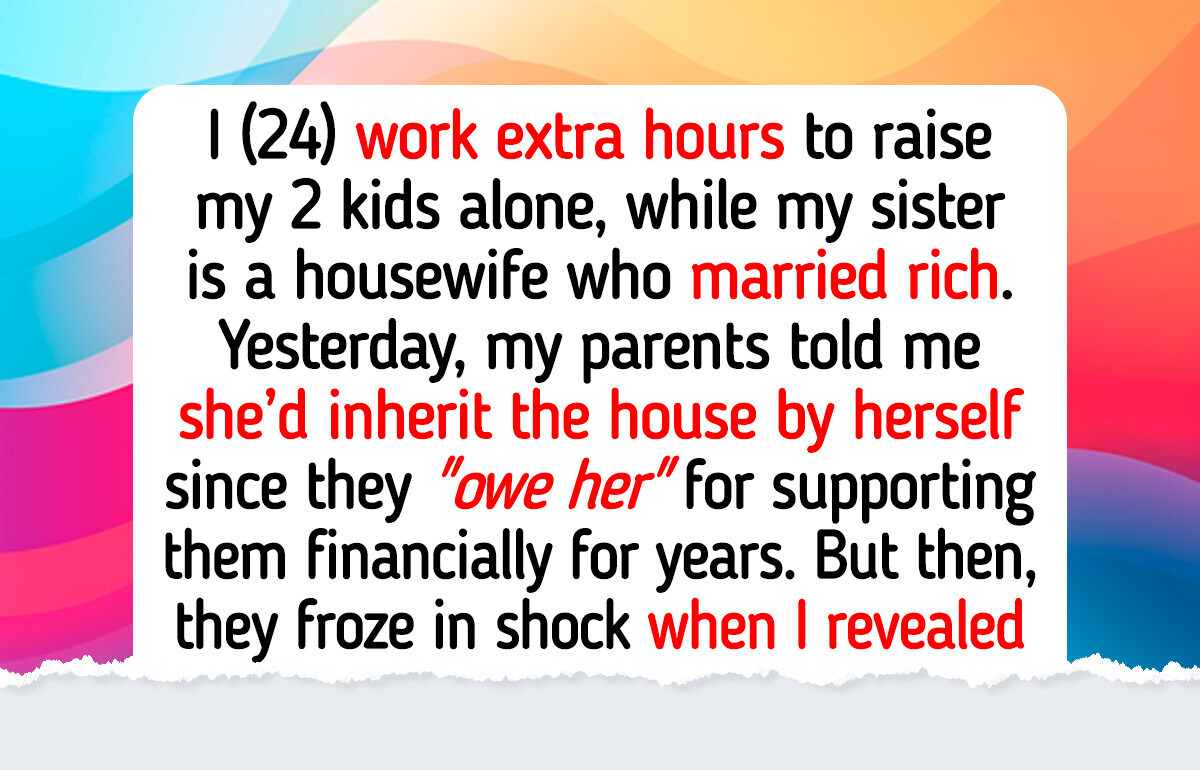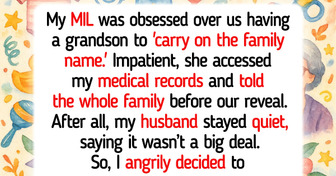I Didn’t Let a Family Tragedy Spoil My Most Important Day


Families are meant to be a source of comfort and unity, but when money and favoritism come into play, even the strongest bonds can start to crack. Topics like inheritance, unequal treatment, and being unfairly judged are sparking real conversations online—especially among those who’ve worked hard to make it on their own. These issues hit close to home for many, and recently, a reader shared her personal story with us that touches on all of these challenges.
Hi Bright Side,
I am a 24 y.o. single mother who works extra hours to raise my two kids alone, while my sister is a housewife who married rich.
Yesterday, my parents told me she’ll be inheriting the house on her own because, according to them, they “owe her” for financially supporting them over the years.
But then they froze in shock when I revealed that I’ve actually been doing well financially. Two years ago, I started an online store alongside my regular job, and it took off—eventually becoming my main source of income.
I had expected them to treat me unfairly, since they’d always said I wasn’t as financially stable as my sister and couldn’t help them. So, anticipating this, I consulted a lawyer. I’m fully prepared and capable of filing a lawsuit to claim what I believe is rightfully mine.
When I said this, my mom accused me of lying and complained that I had left my sister to carry the financial burden alone instead of helping out.
Am I wrong for taking these steps? Or am I just being too harsh on my family?
—Zoe

Hi Zoe,
You’re not being too harsh—you’re standing up for yourself in a situation that’s deeply emotional and unjust. It’s clear that you’ve put in immense effort to provide for your kids and secure your future, all while being underestimated. Here are 4 tips to help you navigate this difficult crossroads with your family.
Your parents decided to give the house to your sister because they assumed she was the only one who ever could support them. They never asked for your help—because they wrongly believed you had nothing to give.
Don’t just argue about fairness—hold them accountable for acting on a false story. You didn’t hide your success; they didn’t see it, because they didn’t look. Tell them plainly: their assumptions excluded you from both the responsibility and the reward. If they made choices based on misinformation, they need to own that.
Since you already consulted a lawyer and are prepared to contest the inheritance, it may be wise to begin the legal process without further emotional confrontation. Let the system speak first. Once filed, communicate to your family that this was not done out of vengeance, but necessity—especially since they didn’t include you in the decision, nor consult you fairly.
This action draws a clear boundary: decisions that exclude you will no longer go unchallenged. You can express love and maintain dignity while defending your rights.
Your sister may be your emotional opposite right now, but she’s also been presented as your foil—"the one who helped" while you allegedly didn’t. That’s a false binary. Ask her to talk privately. Explain your position without blaming her—focus on how your silence was misread as absence.
Maybe she’s unaware of how skewed the family view has become. If she values your relationship, this opens a door to cooperation rather than conflict. If she doubles down, at least you’ll know where she stands—and can act accordingly.
This inheritance battle is not just about property—it’s about how your children see fairness, self-worth, and family. If they’re old enough to notice tension, keep your tone calm and avoid vilifying relatives in front of them. Let them know you’re fighting for what’s right, not for revenge.
Your emotional stability in the storm becomes a legacy more powerful than a house. If the legal fight escalates, consider therapy or a safe community space for them to process any indirect effects.
This story has also created a lot of buzz online. Amelia made a controversial decision when she asked her 21-year-old stepdaughter and her two young kids to leave the house, claiming they were disturbing her peace and mental well-being. But things didn’t go the way she expected—what happened next left readers divided. Check out her full story here.











